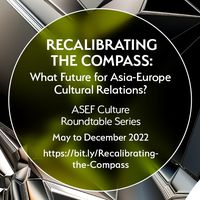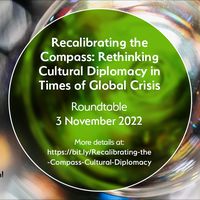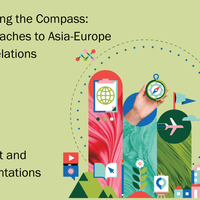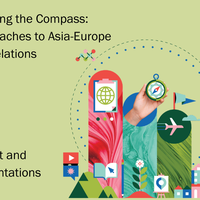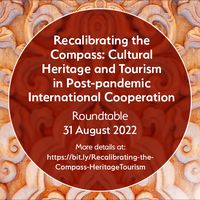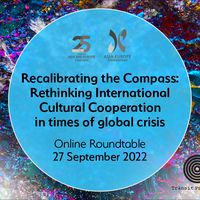What Future for Asia-Europe Cultural Relations? Key findings from ASEF Roundtable Series 2022
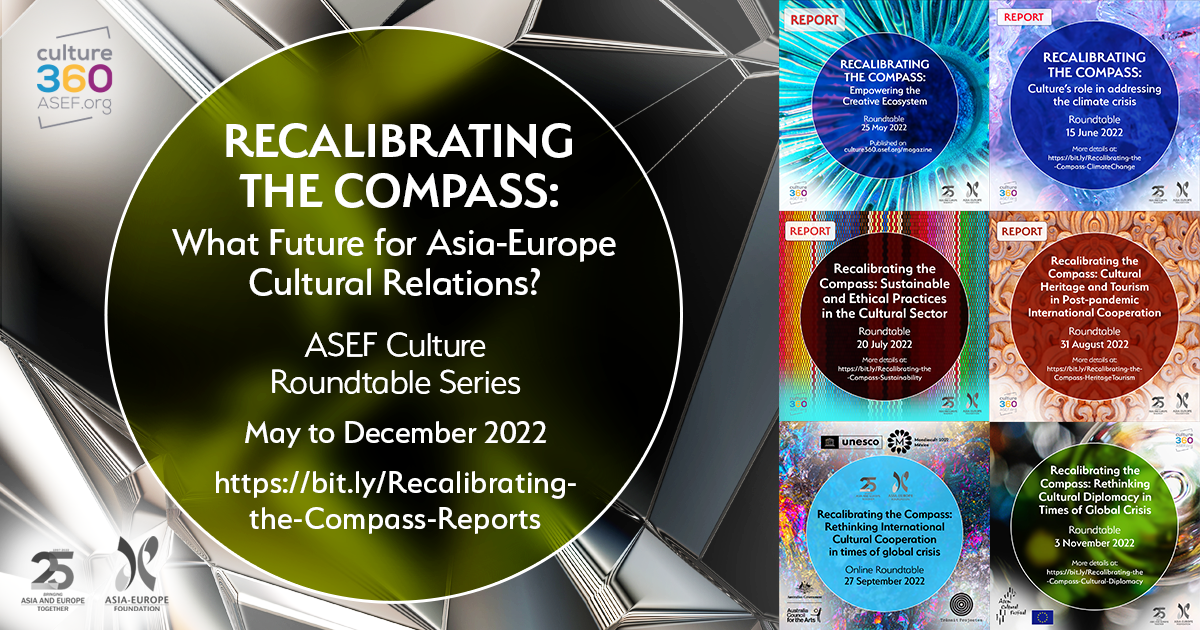
ASEF culture360 is delighted to share key findings and recommendations from the Roundtable Series Recalibrating the Compass that was developed between May and November 2022. Engaging with over 60 experts and stakeholders in the arts and culture sectors of Asia and Europe, this series of 5 roundtables explored key challenges and opportunities for international cultural cooperation in post-pandemic recovery.
The consultation process started in May with a discussion about the impact of the global pandemic on the creative ecosystem. It then addressed the role of culture in climate change and the importance of ethical and sustainable practices for the sector in June and July. The August roundtable focused on heritage and cultural tourism. The final roundtable in November looked at Cultural Diplomacy in the context of Asia and Europe with the aim of offering possible future approaches for the sector. Additionally, a side event of the roundtable was broadcasted online as part of the UNESCO World Conference on Cultural Policies and Sustainable Development – MONDIACULT 2022.

ROUNDTABLE REPORTS
Roundtable #1: Recalibrating the Compass | Empowering the creative ecosystem
Date: 25 May 2022
These are some of the questions that were addressed during the conversation:
How can cultural policies and other non-state stakeholders help to address the challenges and imbalances in the creative ecosystem (working conditions, mobility, gender inequalities, digital divide, etc.)?
How do we establish priorities?
Key Highlights from the Roundtable
The common transversal themes that emerged in the context of Asia-Europe cultural cooperation revolved around sustainability, diversity and collaboration.
Pivoting towards the digital world: The pandemic forced all physical activities to be paused for an uncertain period. In the immediate response to tackle such an unprecedented pause, digital means were explored. This allowed for continued creation of work, reaching newer audiences.
Newer forms of exchange: Hybrid activities involving online and onsite exchanges should be prioritised by arts organisations to provide more options for artists to collaborate.
Continued cooperation in a changing world: As new communities are being engaged, newer, diverse, and inclusive conversations are needed. Institutions in the cultural sector should reassess their role in cooperation, move from gate keeping to enabling artists to artists and organisations to organisations exchanges.
Relooking the concept of cultural mobility: Reformulating cultural mobility such that deeper, longer and more meaningful exchanges through hybrid forms of residencies or fellowships between practitioners are created.
Click here to read Roundtable #1 – Report
Roundtable #2: Recalibrating the Compass | Culture’s role in addressing the Climate Crisis
Date: 15 June 2022
These are some of the questions that were addressed during the conversation:
What is the place of culture in the Climate change discourse?
What are the sectors contributions and responsibilities?
Key Highlights from the Roundtable
- The global pandemic has accelerated a shift in governments towards involving different sectors in addressing the climate crisis. The cultural sector has the capacity and language to sit at the table with the policy makers.
- Cultural institutions have the responsibility to lobby governments to advance the cultural agendas on climate change. In doing so, they need to involve a more diverse range of actors within the sector, including younger and older people.
- A collective approach between artists, arts professionals and organisations in the cultural sector is key in bringing together diverse voices. It also allows for responsibilities to be shared rather than carried out individually.
Click here to read Roundtable #2 – Report
Roundtable #3: Recalibrating the Compass | Sustainable and ethical practices in the cultural sector
Date: 20 July 2022
These are some of the questions that were addressed during the conversation:
What can we learn from local practices in the framework of global cooperation?
What can we learn from indigenous and community practices and how can we address the risk of instrumentalising and commodifying them?
Key Highlights from the Roundtable
The pandemic has seen a shift from an external oriented approach to an inward-looking one in cultural practices. To address this shift and to open up channels for partnerships & collaborations in the future, adopting a transversal approach was highlighted. This would allow for more diverse voices to engage in dialogue in an equal space.
The role of cultural institutions and actors as mediators between governments and local communities is even more important today, while adopting a rights-based approach for engagement of communities. This will allow for shaping an inclusive narrative involving the communities and facing issues and challenges together.
As the cultural sector gears up to step into a transformed future, ensuring fairness and representation in cultural practices requires attention while tackling the risk of instrumentalisation of the communities and their practice.
Click here to read Roundtable #3 – Report
Roundtable #4: Recalibrating the Compass | Cultural Heritage and Tourism in Post-pandemic International Cooperation
Date: 31 August 2022
These are some of the questions that were addressed during the conversation:
How has the pandemic affected heritage sites and heritage-related tourism?
How can we enable new voices and narratives in the presentation of heritage?
Key Highlights from the Roundtable
- Local communities and sustainable tourism: Heritage sites are living sites and local communities are at the centre of them. Administrators and policy makers need to involve these communities more actively in managing and preserving them.
What did we learn from the pandemic?: The pandemic has taught us how to be more resilient and apply risk management as a possible way to learn and create better policies so as to prepare if new crisis occur in the future.
New methodologies post-pandemic: Digitisation of collections has been at the centre of the strategies of many museums, bringing collections outside of the physical space and making them more accessible to younger generations. However, it is important to question the sustainability of digitisation in the long term. Is this effective for all museums?
Click here to read Roundtable #4 – Report
UNESCO Mondiacult - Side event roundtable | Rethinking Cultural Cooperation in times of global crisis
Date: 27 September 2022
Six speakers from Asia and Europe reflected on international culture exchanges in the current evolving geopolitical context. The discussion focused on challenges and opportunities in the post pandemic era, glo-cal actions, and the role of culture in addressing imbalances.
This event was organised in partnership with the Australia Council for the Arts and Transit Projectes (Spain) as an official side event of the UNESCO World Conference on Cultural Policies and Sustainable Development – MONDIACULT 2022 (28-30 September 2022, Mexico City).
Roundtable #5: Recalibrating the Compass | Rethinking cultural diplomacy in times of global crisis
Date: 03 November 2022
The previous roundtables in the series presented contrasting evidence on the impact of the Covid-19 pandemic on the arts and culture sectors, which raises new challenges for cultural practitioners and arts organisations. This roundtable examined how Covid-19 has impacted cultural exchanges and the funding resources and instruments facilitating them, particularly in the Asia-Europe context.
19 experts from Asia and Europe reflected on the concept of cultural diplomacy and the role of arts institutions in Contributing to rethinking forms of cultural exchange in the post-Covid context.
Key Highlights from the Roundtable
Overall questions:
How can organisations involved in cultural relations and diplomacy best contribute towards:
Supporting international cultural cooperation between Asia and Europe in this phase where interregional cooperation is in crisis and there is an increasing inward-looking tendency in many societies?
Bridging the cultural divide between the Global South and the Global North?
Contributing to rethinking forms of cultural exchange in the post-Covid context?
Click here to read Roundtable #5 – Report
The Recalibrating the Compass: What Future for Asia-Europe Cultural Relations? series will culminate in a public forum on 9 February 2023 (5pm Singapore time), where findings and recommendations from the roundtables will be shared and discussed.
Subscribe to our newsletter for the latest updates on the event programme and registration link!
Similar content
from - to
03 Nov 2022 - 03 Nov 2022
posted on
26 Jun 2023
from - to
31 Aug 2022 - 31 Aug 2022
from - to
27 Sep 2022 - 27 Sep 2022

